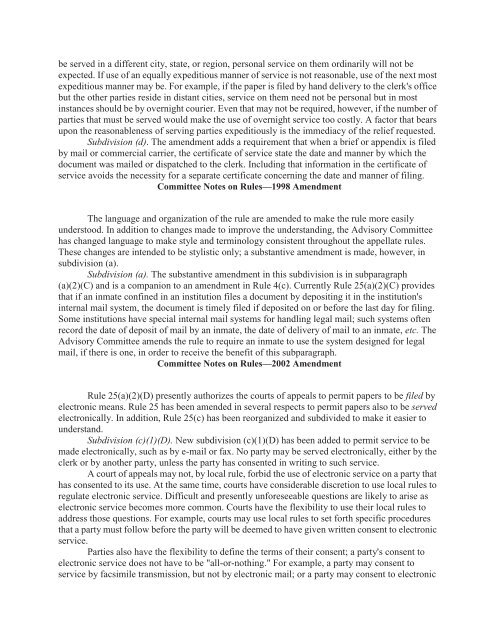Federal Rules of Appellate Procedure 2014-2015, 2014a
Federal Rules of Appellate Procedure 2014-2015, 2014a
Federal Rules of Appellate Procedure 2014-2015, 2014a
You also want an ePaper? Increase the reach of your titles
YUMPU automatically turns print PDFs into web optimized ePapers that Google loves.
e served in a different city, state, or region, personal service on them ordinarily will not be<br />
expected. If use <strong>of</strong> an equally expeditious manner <strong>of</strong> service is not reasonable, use <strong>of</strong> the next most<br />
expeditious manner may be. For example, if the paper is filed by hand delivery to the clerk's <strong>of</strong>fice<br />
but the other parties reside in distant cities, service on them need not be personal but in most<br />
instances should be by overnight courier. Even that may not be required, however, if the number <strong>of</strong><br />
parties that must be served would make the use <strong>of</strong> overnight service too costly. A factor that bears<br />
upon the reasonableness <strong>of</strong> serving parties expeditiously is the immediacy <strong>of</strong> the relief requested.<br />
Subdivision (d). The amendment adds a requirement that when a brief or appendix is filed<br />
by mail or commercial carrier, the certificate <strong>of</strong> service state the date and manner by which the<br />
document was mailed or dispatched to the clerk. Including that information in the certificate <strong>of</strong><br />
service avoids the necessity for a separate certificate concerning the date and manner <strong>of</strong> filing.<br />
Committee Notes on <strong>Rules</strong>—1998 Amendment<br />
The language and organization <strong>of</strong> the rule are amended to make the rule more easily<br />
understood. In addition to changes made to improve the understanding, the Advisory Committee<br />
has changed language to make style and terminology consistent throughout the appellate rules.<br />
These changes are intended to be stylistic only; a substantive amendment is made, however, in<br />
subdivision (a).<br />
Subdivision (a). The substantive amendment in this subdivision is in subparagraph<br />
(a)(2)(C) and is a companion to an amendment in Rule 4(c). Currently Rule 25(a)(2)(C) provides<br />
that if an inmate confined in an institution files a document by depositing it in the institution's<br />
internal mail system, the document is timely filed if deposited on or before the last day for filing.<br />
Some institutions have special internal mail systems for handling legal mail; such systems <strong>of</strong>ten<br />
record the date <strong>of</strong> deposit <strong>of</strong> mail by an inmate, the date <strong>of</strong> delivery <strong>of</strong> mail to an inmate, etc. The<br />
Advisory Committee amends the rule to require an inmate to use the system designed for legal<br />
mail, if there is one, in order to receive the benefit <strong>of</strong> this subparagraph.<br />
Committee Notes on <strong>Rules</strong>—2002 Amendment<br />
Rule 25(a)(2)(D) presently authorizes the courts <strong>of</strong> appeals to permit papers to be filed by<br />
electronic means. Rule 25 has been amended in several respects to permit papers also to be served<br />
electronically. In addition, Rule 25(c) has been reorganized and subdivided to make it easier to<br />
understand.<br />
Subdivision (c)(1)(D). New subdivision (c)(1)(D) has been added to permit service to be<br />
made electronically, such as by e-mail or fax. No party may be served electronically, either by the<br />
clerk or by another party, unless the party has consented in writing to such service.<br />
A court <strong>of</strong> appeals may not, by local rule, forbid the use <strong>of</strong> electronic service on a party that<br />
has consented to its use. At the same time, courts have considerable discretion to use local rules to<br />
regulate electronic service. Difficult and presently unforeseeable questions are likely to arise as<br />
electronic service becomes more common. Courts have the flexibility to use their local rules to<br />
address those questions. For example, courts may use local rules to set forth specific procedures<br />
that a party must follow before the party will be deemed to have given written consent to electronic<br />
service.<br />
Parties also have the flexibility to define the terms <strong>of</strong> their consent; a party's consent to<br />
electronic service does not have to be "all-or-nothing." For example, a party may consent to<br />
service by facsimile transmission, but not by electronic mail; or a party may consent to electronic


















